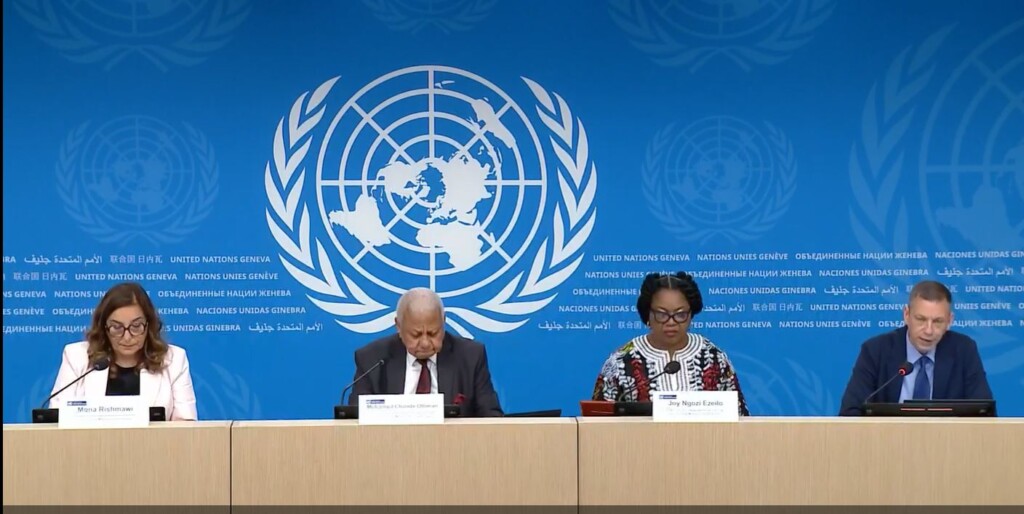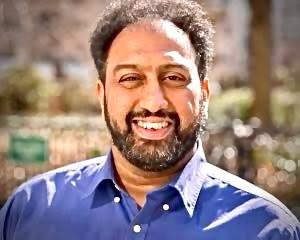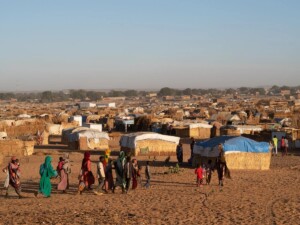Consultations begin to extend mandate of UN fact-finding mission on human rights in Sudan

Press conference of the Fact-Finding Mission on Human Rights in Sudan - Geneva (Photo: UN)
Representatives of Britain, Norway, the Netherlands, Germany, and Ireland, began consultations in Geneve in Switzerland on Tuesday, on the drafting of a draft resolution to extend the mandate of the UN fact-finding mission on human rights in Sudan. They will also discuss proposals to include a clause on an international investigation into the use of chemical weapons during the ongoing war. The mission was formed by the UN Human Rights Council after the outbreak of war in Sudan in 2023, and its mandate was extended last year for a year.
The Sudanese government demands and refuses to deal with the mandate of the fact-finding mission, considering that sufficiency with the independent human rights expert and the Office of the High Commissioner is sufficient.
Mohamed Saleh Yassin, a human rights defender and member of the leadership of the “Sumoud” alliance, told Radio Dabanga that the consultations took place in two sessions yesterday morning and evening, and will resume next Tuesday.
Representatives of member States of the Human Rights Council, as well as civil society organizations, participated in the consultations.
He explained that there are proposals to include a text on the international investigation into the use of chemical weapons in Sudan by the two warring parties.
The US administration has imposed sanctions on Sudan for the use of chemical weapons by the armed forces. Many in the Sudanese government have also accused the Rapid Support Forces (RSF) of using chemical weapons in Khartoum, before the Ministry of Health recently denied this.
A predominant trend towards extension
Yassin explained that the consultations are still in their initial stages, but the prevailing trend is to extend the mission, amid the objections of some countries from the African and Arab groups, while the countries of Europe, Asia and Latin America support the extension.
He added that the countries that reject the extension are citing the financial crisis that the United Nations is experiencing, noting that the mission costs five million dollars annually. But he noted that there was widespread rejection of this justification.
He added that the resolution will be put to a vote in the last week of meetings, expecting it to pass with a majority of votes.
The decision to extend the mission’s mission last year was approved by a vote of 23, with 12 abstentions and 12 abstentions.
In its report last week, the mission reported that both sides of the war had committed war crimes and grave violations, while the Rapid Support Forces (RSF) had committed crimes against humanity.
The Committee recommended that the jurisdiction of the International Criminal Court be extended to all parts of the Sudan or that an independent judicial system be established.
Most States have expressed support for the report and the mission, amid objections from other States.
UN Report:
“A war of atrocities:” Sudan civilians deliberately targeted, UN Fact-Finding Mission reports international crimes on large-scale
05 September 2025
GENEVA – Rival forces in Sudan are deliberately targeting the devastated nation’s civilian population, committing atrocities including war crimes on a large scale, the Independent International Fact-Finding Mission for the Sudan said in its latest report. Some acts may also amount to the crimes against humanity, including persecution and extermination.
The report to the UN Human Rights Council, “A War of Atrocities,” found that both the Sudanese Armed Forces (SAF) and the Rapid Support Forces (RSF) were responsible not only for direct and large-scale attacks against civilians, but also for the extensive destruction of essential infrastructure for survival, including medical centres, markets, food and water systems, and displacement camps.
The report also found that the RSF, during the siege of El Fasher and surrounding areas, committed myriad crimes against humanity, including murder, torture, enslavement, rape, sexual slavery, sexual violence, forced displacement and persecution on ethnic, gender and political grounds. The RSF and its allies used starvation as a method of warfare and deprived civilians of objects indispensable to their survival, including food, medicine and relief supplies – which may amount to the crime against humanity of extermination.
“Our findings leave no room for doubt: civilians are paying the highest price in this war,” said Mohamed Chande Othman, chair of the Fact-Finding Mission. “Both sides have deliberately targeted civilians through attacks, summary executions, arbitrary detention, torture, and inhuman treatment in detention facilities, including denial of food, sanitation, and medical care. These are not accidental tragedies but deliberate strategies amounting to war crimes. The RSF has further committed crimes against humanity, including large-scale killings, sexual and gender-based violence, looting, and the destruction of livelihoods—at times rising to persecution and extermination.”
Civilians are being targeted based on their perceived affiliation with the other side. In El Fasher and surrounding areas, the RSF and its allies carried out large-scale killings of hundreds of civilians, intentionally directing attacks against non-Arab communities including the Zaghawa, Fur, Masalit, and Tunjur, and forcibly displacing populations. In Zamzam camp in April, between 300 and 1,500 civilians — mostly women and children — were massacred. In Gezira, the SAF and its allies targeted the Kanabi community after recapturing the town in January, killing dozens and forcing most residents to flee.
Both parties failed to take sufficient measures to minimize the impact of airstrikes and artillery on civilians and civilian infrastructure. As a result, towns, villages, displacement camps, markets, hospitals and homes have been systematically destroyed or rendered uninhabitable, leaving 12.1 million people displaced and more than half the nation facing acute food insecurity. Only one in four health facilities remains functional in the worst-affected regions.
Humanitarian assistance has been obstructed, convoys attacked, and aid workers targeted. Between April 2023 and April 2025, more than 84 Sudanese humanitarian workers were killed, while others were arbitrarily detained.
The report found that both sides have arbitrarily arrested, detained and tortured civilians because of the victims’ ethnicity, political opinion, profession or alleged collaboration with the opposing party. Detainees were frequently held without access to adequate food, sanitation or medical care. RSF detention centres were described by survivors as “slaughterhouses” where in some cases, detainees were beaten to death and summarily executed. Some were subjected to forced labour or held for ransom, with families forced to pay for their release.
Sexual and gender-based violence, including rape, gang rape, forced marriage and sexual slavery was committed by RSF fighters. Women and girls from non-Arab communities, some as young as 12, were particularly targeted. SAF personnel and allied forces were also implicated in acts of sexualized torture in detention.
“Behind every documented story is a shattered family, a displaced community, a survivor of unimaginable violence,” said Joy Ngozi Ezeilo, an expert Member of the Fact-Finding Mission. “We have interviewed numerous civilians who have endured extreme trauma and suffered or witnessed killings, starvation, sexual violence, torture, and the destruction of essential services. The cycle of impunity has emboldened perpetrators for decades. Victims — especially women and children, who bear the greatest burden — deserve justice and reparations.”
The report outlined steps necessary for accountability, emphasizing that justice and protection cannot wait until a peace agreement is reached. Sudan’s domestic institutions remain unwilling and unable genuinely to conduct credible investigations. Instead, they perpetuate selective justice, shield perpetrators through immunities and amnesties, and continue to deny survivors any real prospect of redress.
“Our report not only exposes atrocities, it also lays out a roadmap for justice,” said expert Member Mona Rishmawi. “The international community must act now to enforce the arms embargo, support justice by backing the International Criminal Court, establish an independent judicial mechanism for Sudan, use universal jurisdiction to hold perpetrators accountable, and ensure that those orchestrating atrocities face consequences, including targeted sanctions.”
“Every day of inaction leaves the Sudanese people under attack – their lives, communities, and survival at risk,” Rishmawi said. “Accountability is not optional – it is a legal and moral imperative to protect civilians and prevent further atrocities.”
The Fact-Finding Mission called on the international community to impose targeted sanctions against individuals and entities responsible for international crimes. It also pressed for swift and coordinated action to cease hostilities, protect civilians, lift sieges, and halt ethnic targeting and sexual and gender-based violence. It urged all States, particularly those with influence on the parties, to abide by arms embargoes and refrain from providing them with material support and increase humanitarian assistance.
“Sudan is living through one of the world’s worst humanitarian crises and gravest hunger emergencies, with some of its population facing war crimes, persecution and extermination,” Othman said. “The international community has the tools to act. Failure to do so would not only betray the Sudanese people — it would betray the very foundations of international law.”Read the full report here, and its Annex here.











 and then
and then